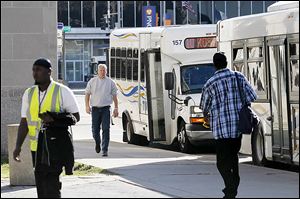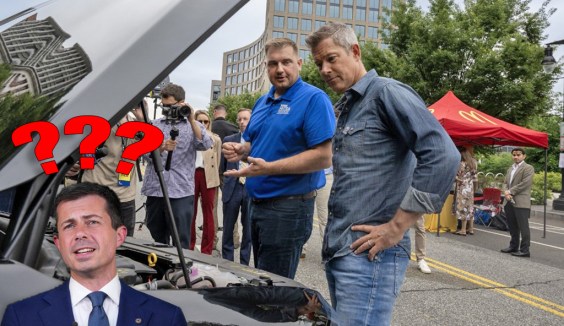Let's say you're a Rust Belt city trying to dust off your stale image and compete in the 21st century. You would think the last thing you would want to do is prevent able-bodied people in your region from working, especially those who are most economically vulnerable.

But you'd be wrong! Perrysburg, Ohio, a suburban neighbor of Toledo, where I was born, is taking a page from Detroit, carving out big parts of the region to exempt from transit service.
The Toledo Blade, in an article that almost hurts to read, explains that voters in suburban Perrysburg have decided to "opt out" of the suffering regional transit system, TARTA. People that relied on the service to get to their jobs? They're out of luck. Perrysburg voters will decide in November whether to replace the regional system with some privately run local system, but that isn’t much use to people like Glenn Perryman:
Perryman of Toledo boarded a downtown TARTA bus Tuesday on his way to the Perrysburg Hilton Garden Inn, where he’s worked as a dishwasher and cook for the past three years.
People such as Mr. Perryman, who spends more than three hours on a bus getting to and from work each day, make extraordinary efforts to stay on the grind, commuting to suburban jobs that often pay little more than minimum wage.
Bus driver Liz Potts, a 23-year TARTA veteran, heard the stories all week: A young man who can’t get to his job at McDonald’s, a senior who needs the bus to get to a center, others like Mr. Perryman who make a few hundred dollars a week and now will have to pay someone to drive them to work.
So, ok. Maybe the majority of Perrysburg voters don't care whether low-income people are able to work or whether the current transportation system will force them into dependency. But what about businesses? You would think this region wouldn't want to alienate business owners. But Perrysburg voters don't seem to care, the Blade reports:
Mr. Perryman’s boss, Izzet Sozeri, the general manager of the Hilton Garden Inn in Perrysburg, tried to persuade City Council to take another route.
Mr. Sozeria told me that 25 percent of his 150 employees use TARTA, and many more workers use it to get to jobs at other Levis Commons [a lifestyle center-style mall] businesses. Those employees, he noted, pay city income taxes.
Perrysburg’s transit plan might work for residents, but “it’s not a solution for business,’’ he said. “TARTA has been an important part of our daily life.”
Tragically, another Toledo suburb, Sylvania, is considering opting out of its transit system as well. It's enough to make you wonder: Is metro Toledo trying to have a bad economy? If so, preventing workers from getting to work seems like a great strategy.





